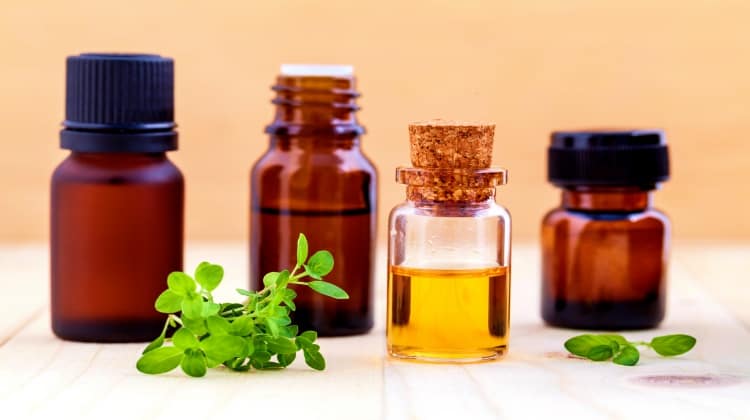Table of Contents
Obsessive Compulsive Disorder (OCD) can be a challenging condition to manage, but there are natural remedies that can offer relief and support. Essential oils have gained popularity as an alternative therapy for OCD, harnessing the power of aromatherapy and therapeutic essential oils to alleviate symptoms and promote a holistic approach to treatment.
Aromatherapy, the use of essential oils to enhance physical and mental well-being, has been shown to have a calming effect on the mind and body. Essential oils such as lavender, chamomile, and bergamot have been specifically studied for their potential benefits in managing OCD symptoms. By incorporating essential oils into your daily routine, you can complement your current treatment plan and work towards managing OCD in a natural and holistic way.
Key Takeaways:
- Essential oils can be used as a complementary therapy for OCD
- Aromatherapy with essential oils has calming effects on the mind and body
- Lavender, chamomile, and bergamot are essential oils that have been studied for their benefits in managing OCD symptoms
- Incorporating essential oils into your daily routine can promote a holistic approach to OCD treatment
- Always consult with a healthcare professional before making any changes to your treatment plan
1 Understanding Obsessive Compulsive Disorder (OCD)
Obsessive Compulsive Disorder, or OCD, is a mental health condition characterized by recurring, intrusive thoughts (obsessions) and repetitive behaviors (compulsions) that individuals feel driven to perform. Some common OCD symptoms include excessive handwashing, checking and rechecking, arranging items in a particular order, and intrusive thoughts. OCD can have a significant impact on a person’s daily life, causing distress and interfering with their ability to function.
There are various treatment options available for OCD, including therapy, medication, and alternative treatments like essential oils.
OCD diagnosis is made based on a thorough evaluation by a healthcare professional, typically a psychiatrist or psychologist. The healthcare professional will assess the individual’s symptoms, medical history, and perform a psychological evaluation to determine if they meet the diagnostic criteria for OCD.
2 The Science Behind Essential Oils for OCD

Essential oils have gained popularity for their therapeutic benefits, offering a natural and holistic approach to mental health. When used in aromatherapy or applied topically, essential oils can have a profound impact on the brain and nervous system, promoting relaxation, reducing anxiety, and improving mood. Research suggests that these concentrated plant extracts have the potential to effectively manage symptoms of mental health conditions, including obsessive-compulsive disorder (OCD).
Lavender, chamomile, bergamot, and frankincense are among the essential oils that have been extensively studied for their calming and anxiety-reducing effects. These oils contain active compounds that directly interact with the brain, helping to alleviate OCD symptoms and support overall mental well-being.
Studies have shown that lavender essential oil has a calming effect and can help reduce anxiety and promote relaxation. Its soothing aroma has been found to ease obsessive thoughts and provide relief from the repetitive behaviors associated with OCD.
Chamomile essential oil is known for its gentle and soothing properties. It has been shown to help ease feelings of stress and anxiety, promoting a sense of calm and emotional balance. Incorporating chamomile essential oil into your daily routine can provide much-needed support for managing OCD symptoms.
Bergamot essential oil has uplifting and mood-enhancing effects. Its citrusy aroma can help elevate mood and reduce obsessive thoughts, providing a sense of clarity and inner peace. This oil is often used in conjunction with other essential oils to create personalized blends for OCD symptom management.
Frankincense essential oil has grounding and centering properties. It has been traditionally used for its calming effects on the mind and body. Incorporating frankincense oil into your self-care routine can help reduce anxiety and stress associated with OCD, promoting a sense of overall well-being.
It’s important to note that while essential oils show promise in managing OCD symptoms, they should be used as a complementary therapy and not as a replacement for evidence-based treatments. Consultation with a healthcare professional is essential to determine the best course of treatment for your individual needs.
Essential oils offer a natural and holistic approach to managing OCD. With their therapeutic benefits and calming effects, these plant extracts can be a valuable addition to your OCD management toolbox. When used properly and in conjunction with other treatments, essential oils can provide natural relief and support for your mental well-being.
3 Using Essential Oils for OCD Symptom Management
Essential oils can be a valuable tool in managing OCD symptoms. They can be used in various ways to provide relief and promote relaxation. Here are some methods for incorporating essential oils into your OCD management routine:
- Inhalation: One of the most common methods is inhalation, where the oils are diffused into the air using an essential oil diffuser. You can also inhale the oils directly from the bottle. This allows the aroma of the oils to have a calming effect on your mind and body.
- Topical Application: Another method is topical application. Dilute the essential oils in a carrier oil, such as coconut oil or jojoba oil, and apply the mixture to your skin. Common areas for application include the wrists, temples, and back of the neck. This can provide a sense of relaxation and help reduce anxiety.
- Essential Oil Blends: Some individuals find relief by using essential oil blends specifically formulated for OCD symptoms. These blends often combine oils with complementary properties to maximize their therapeutic benefits. You can either purchase pre-made blends or create your own blend using individual oils.
Using essential oils for OCD symptom management offers a natural and holistic approach to complement other treatment options. However, it’s important to remember that essential oils should not replace evidence-based therapies or medical advice. Consult with a healthcare professional to determine the best course of treatment for your individual needs. They can provide guidance on the safe and appropriate use of essential oils for managing your OCD symptoms.
“Inhaling calming essential oils can help alleviate OCD symptoms and promote relaxation.”
Remember to always choose high-quality essential oils from reputable brands to ensure their purity and effectiveness. Experiment with different oils and methods of application to find what works best for you. Incorporating essential oils into your OCD management routine can provide a soothing and comforting experience, supporting your overall well-being.
To get started, here are some essential oils commonly used for managing OCD symptoms:
| Essential Oil | Main Benefits |
|---|---|
| Lavender | Calming, reduces anxiety and stress |
| Chamomile | Soothing, promotes relaxation |
| Bergamot | Uplifting, reduces obsessive thoughts |
| Frankincense | Grounding, reduces anxiety and stress |
Remember to patch test any essential oils before applying them to larger areas of the body and follow the recommended dilution guidelines for safe use. With the right approach and guidance, essential oils can be a valuable addition to your OCD management strategy, providing natural relief and promoting a sense of calm.
4 Recommended Essential Oils for OCD
Certain essential oils have shown promise in managing OCD symptoms. Lavender essential oil is known for its calming properties and can help reduce anxiety and promote relaxation. Chamomile essential oil has a soothing aroma that can help ease feelings of stress and promote a sense of calm. Bergamot essential oil has uplifting properties and can help elevate mood and reduce obsessive thoughts. Frankincense essential oil has grounding and centering effects, which can help reduce symptoms of anxiety and stress associated with OCD. These oils can be used individually or in combination to create personalized blends.
| Essential Oil | Properties | Benefits |
|---|---|---|
| Lavender | Calming | Reduces anxiety, promotes relaxation |
| Chamomile | Soothing | Eases stress, promotes calm |
| Bergamot | Uplifting | Elevates mood, reduces obsessive thoughts |
| Frankincense | Grounding | Reduces anxiety and stress |
5 How to Use Essential Oils for OCD

Essential oils can be used in various ways to manage OCD symptoms. Understanding the different application methods and ensuring essential oil safety is essential for effective use.
Inhalation
Inhalation is a popular and accessible method for using essential oils. There are a few ways to inhale essential oils:
- Diffuser: Use a diffuser to disperse essential oils throughout the air in your home or workspace. This allows you to consistently experience the therapeutic benefits of the oils.
- Direct inhalation: Inhale the aroma of essential oils directly from the bottle. Simply open the bottle and take a few deep breaths, allowing the scent to calm your mind and ease symptoms.
- Tissue or cotton ball: Add a few drops of your chosen essential oil to a tissue or cotton ball and inhale deeply. This portable method allows you to carry the soothing scent with you wherever you go.
Topical Application
Topical application involves applying diluted essential oils directly to the skin. This method allows the oils to be absorbed into the body and provide localized relief for specific areas. Here are some tips for topical application:
- Carrier oil: Always dilute essential oils in a carrier oil, such as coconut oil, almond oil, or jojoba oil. This helps prevent skin irritation and ensures safe usage.
- Key areas: Apply the diluted essential oil to key areas, such as the wrists, temples, or back of the neck. These areas have high blood flow, enhancing the absorption of the oil.
- Patch test: Before applying essential oils to larger areas of the body, perform a patch test. Apply a small amount of the diluted oil to a small area of skin and wait 24 hours to check for any adverse reactions.
Remember, essential oils are highly concentrated and should be used with caution. It’s crucial to dilute them properly, follow recommended guidelines, and prioritize safety.
Now that you know how to use essential oils for OCD, let’s explore some of the recommended essential oils in the next section.
6 Other Complementary Therapies for OCD
In addition to essential oils, there are other complementary therapies and holistic approaches that can be beneficial for managing OCD symptoms. These include cognitive-behavioral therapy (CBT), mindfulness meditation, yoga, and acupuncture.
Cognitive-behavioral therapy (CBT):
CBT is a type of therapy that focuses on changing harmful thought patterns and behaviors. It involves working with a trained therapist to identify and challenge negative thoughts and develop healthier coping mechanisms. CBT can help individuals with OCD gain control over their obsessions and compulsions, leading to improved quality of life.
Mindfulness meditation and yoga:
Mindfulness meditation and yoga can be powerful tools for reducing stress and promoting relaxation. These practices help individuals cultivate awareness of the present moment and develop skills to manage anxiety. By incorporating mindfulness and yoga into their daily routines, individuals with OCD can find relief from intrusive thoughts and achieve a sense of calm.
Acupuncture:
Acupuncture, a traditional Chinese medicine practice, involves the insertion of thin needles into specific points on the body to promote balance and wellbeing. It is believed to stimulate the body’s natural healing processes and restore energy flow. Acupuncture can be used to address symptoms of anxiety and stress associated with OCD, offering a holistic approach to treatment.
These complementary therapies can be used in conjunction with essential oils to create a comprehensive and personalized approach to managing OCD. By combining multiple holistic treatments, individuals can optimize their chances of finding relief from symptoms and improving their overall well-being.
7 Consult a Healthcare Professional
While essential oils and other complementary therapies can provide relief for OCD symptoms, it’s crucial to consult with a healthcare professional before making any changes to your treatment plan. A healthcare professional can provide guidance and ensure that the use of essential oils is safe and appropriate for your specific needs.
When it comes to mental health, taking a holistic approach is essential. Consulting a healthcare professional allows you to explore alternative therapies for mental health, such as essential oils, within a comprehensive treatment plan. They can evaluate your condition, provide an accurate diagnosis, and recommend evidence-based treatments that align with your unique circumstances.
Essential oils, when used under the guidance of a healthcare professional, can complement other therapies and interventions. By incorporating essential oils into your treatment plan, you can experience potential benefits like reduced anxiety, improved mood, and enhanced overall well-being.
It’s important to remember that essential oils are not a substitute for medical treatment but rather a complementary therapy that can support your overall mental health. A healthcare professional can help you navigate the complexities of OCD treatment and provide a holistic approach that encompasses various modalities.
Lastly, a healthcare professional can help you understand the proper application and usage of essential oils. They can guide you in selecting the most suitable essential oils for your specific needs and advise on any potential interactions or contraindications.
Remember, consulting a healthcare professional is crucial for receiving personalized and evidence-based care. They can help create an individualized treatment plan that incorporates essential oils and other alternative therapies to support your journey towards better mental health.
Consult a healthcare professional today and discover how a holistic approach to mental health, including essential oils and alternative therapies, can contribute to your overall well-being.
8 Conclusion
In summary, essential oils have shown potential as a natural and calming support for managing symptoms of Obsessive Compulsive Disorder (OCD). While they can offer benefits, it is important to remember that essential oils should be used as part of a comprehensive treatment plan that includes evidence-based therapies. Consult with a healthcare professional to determine the best course of treatment for your individual needs.
Essential oils, such as lavender, chamomile, bergamot, and frankincense, can be a valuable addition to your OCD management toolbox. Their calming properties can help reduce anxiety, promote relaxation, and alleviate symptoms associated with OCD. However, it is crucial to use essential oils safely, following proper dilution guidelines and performing patch tests before application.
Remember, while essential oils can provide relief, they should not replace prescribed medication or therapy. Work with a healthcare professional to create a comprehensive treatment plan that addresses all aspects of your OCD. By incorporating essential oils alongside evidence-based therapies, you can take a holistic approach to managing your OCD symptoms and promoting your mental well-being.
FAQ
Can essential oils be used as a natural remedy for OCD?
Yes, essential oils can provide natural relief for OCD symptoms and can be used as a complementary therapy alongside other treatment options.
What is Obsessive Compulsive Disorder (OCD)?
Obsessive Compulsive Disorder is a mental health condition characterized by recurring, intrusive thoughts (obsessions) and repetitive behaviors (compulsions).
What are some common symptoms of OCD?
Common symptoms of OCD include excessive handwashing, checking and rechecking, arranging items in a particular order, and intrusive thoughts.
What treatment options are available for OCD?
There are various treatment options available for OCD, including therapy, medication, and alternative treatments like essential oils.
How do essential oils work for managing OCD symptoms?
When inhaled or applied topically, essential oils can have a direct effect on the brain and nervous system, promoting relaxation, reducing anxiety, and improving mood.
Are there specific essential oils that are recommended for managing OCD symptoms?
Yes, lavender, chamomile, bergamot, and frankincense are some of the essential oils that have shown promise in managing symptoms of OCD.
How can essential oils be used to manage OCD symptoms?
Essential oils can be used through inhalation or topical application, either by using a diffuser, inhaling directly from the bottle, or diluting them in a carrier oil and applying them to the skin.
What are some other complementary therapies for managing OCD?
Other complementary therapies for managing OCD include cognitive-behavioral therapy (CBT), mindfulness meditation, yoga, and acupuncture.
Is it necessary to consult a healthcare professional before using essential oils for OCD?
Yes, it’s important to consult a healthcare professional before making any changes to your treatment plan and ensure that the use of essential oils is safe and appropriate for your specific needs.
We may earn a commission for purchases made using our links. Please see our disclosure to learn more. We appreciate your support SO very much.











